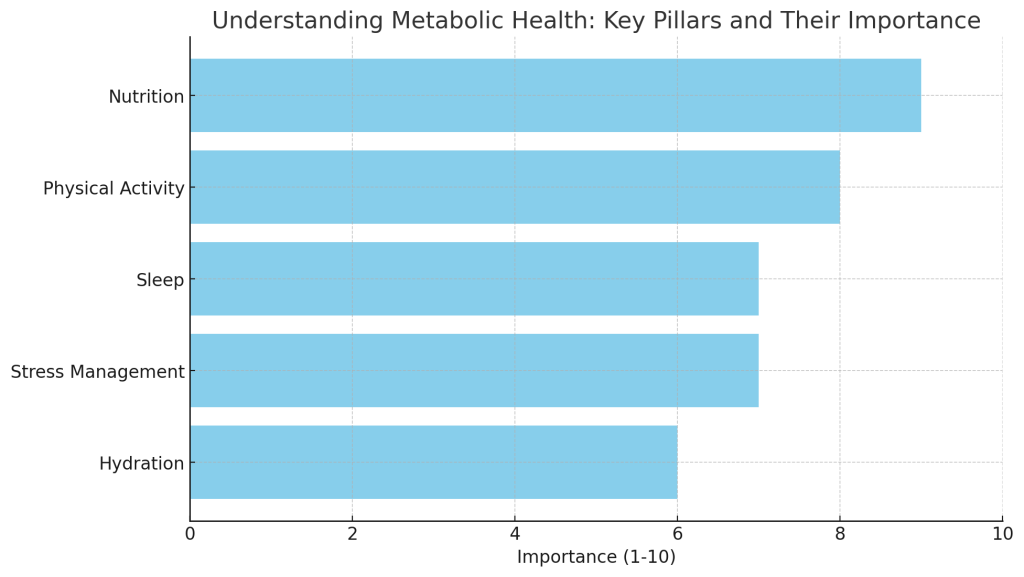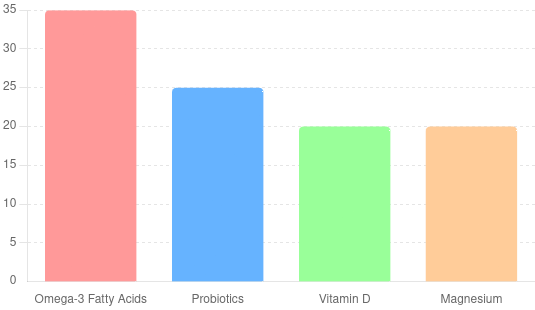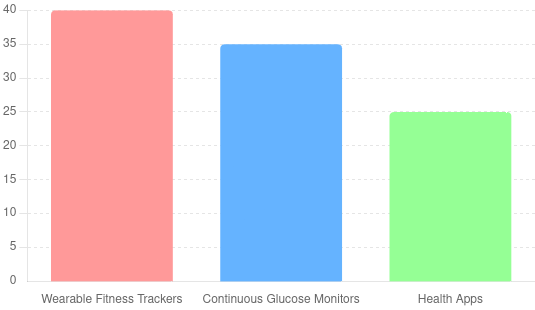Unlocking the Secrets of Metabolic Health: A Comprehensive Guide
In today’s fast-paced world, maintaining optimal health is more important than ever. At the heart of overall well-being lies metabolic health, a crucial yet often overlooked aspect of our bodily functions. This comprehensive guide aims to unravel the secrets of metabolic health, offering insights into what it is, why it matters, and how you can achieve and maintain it.
Understanding Metabolic Health
Metabolic health refers to the optimal functioning of metabolic processes, which include converting food into energy, managing blood sugar levels, and regulating cholesterol and blood pressure. Good metabolic health implies that your body efficiently handles these processes, reducing the risk of chronic diseases such as diabetes, heart disease, and stroke.

The Pillars of Metabolic Health
To unlock the secrets of metabolic health, it’s essential to focus on several key areas:
1. Nutrition
What you eat profoundly impacts your metabolic health. A balanced diet rich in whole foods, lean proteins, healthy fats, and complex carbohydrates can support metabolic processes. Key nutrients to focus on include:
- Fiber: Aids digestion and helps maintain stable blood sugar levels.
- Protein: Supports muscle health and helps you feel full longer.
- Healthy fats: Essential for cell function and hormone production.
- Antioxidants: Combat oxidative stress and inflammation.
2. Physical Activity
Regular exercise is vital for maintaining metabolic health. Physical activity helps regulate blood sugar levels, improve cardiovascular health, and boost metabolic rate. Aim for a combination of aerobic exercises (like walking or cycling) and strength training to maximize benefits.
3. Sleep
Quality sleep is often underestimated but is crucial for metabolic health. Poor sleep can disrupt hormones that regulate hunger and blood sugar levels, leading to weight gain and increased risk of metabolic disorders. Aim for 7-9 hours of restful sleep per night.
4. Stress Management
Chronic stress can wreak havoc on your metabolism. Stress hormones such as cortisol can increase blood sugar levels and promote fat storage, particularly around the abdomen. Incorporate stress-reducing activities such as mindfulness, meditation, yoga, or simply spending time in nature.
5. Hydration
Staying hydrated is essential for metabolic processes, including digestion and temperature regulation. Aim to drink at least eight glasses of water a day, more if you’re physically active or live in a hot climate.
Monitoring and Maintaining Metabolic Health
To ensure you’re on the right track, it’s important to monitor your metabolic health. Key metrics to keep an eye on include:
- Blood sugar levels: Both fasting glucose and hemoglobin A1c can provide insights into how well your body manages blood sugar.
- Cholesterol levels: Regular lipid panels can help you understand your risk for cardiovascular diseases.
- Blood pressure: Maintaining a healthy blood pressure is critical for overall health.
- Waist circumference: Excess abdominal fat is a significant risk factor for metabolic diseases.

This pie chart provides a visual representation of the key metrics essential for monitoring and maintaining metabolic health. Each segment of the pie chart highlights the relative importance of the following metrics:
- Blood Sugar Levels (30%): Monitoring blood sugar levels is crucial for detecting and managing conditions like diabetes. Keeping blood sugar levels within a healthy range helps prevent long-term complications associated with high or low blood sugar.
- Cholesterol Levels (25%): Regularly checking cholesterol levels, including LDL (bad cholesterol), HDL (good cholesterol), and triglycerides, is important for cardiovascular health. Maintaining healthy cholesterol levels reduces the risk of heart disease and stroke.
- Blood Pressure (25%): Blood pressure is a vital sign that reflects the force of blood against the walls of the arteries. High blood pressure can lead to serious health issues like heart attack and stroke. Monitoring and managing blood pressure is essential for overall cardiovascular health.
- Waist Circumference (20%): Waist circumference is an indicator of abdominal fat, which is a risk factor for metabolic syndrome, diabetes, and cardiovascular diseases. Measuring waist circumference helps assess the risk of these conditions and guides lifestyle interventions.
Importance of Each Metric
- Blood Sugar Levels: The largest segment (30%) underscores the significance of maintaining stable blood sugar levels for metabolic health.
- Cholesterol Levels: Equally important to blood pressure, this metric (25%) emphasizes the need to manage cholesterol for cardiovascular health.
- Blood Pressure: Another critical component (25%) that reflects the importance of keeping blood pressure in check to prevent cardiovascular complications.
- Waist Circumference: Although slightly smaller (20%), this metric highlights the relevance of monitoring abdominal fat to reduce the risk of metabolic disorders.
Personalized Approaches
Every individual is unique, and so is their metabolism. Personalizing your approach to metabolic health can yield better results. Consider working with healthcare professionals to develop a tailored plan that considers your genetics, lifestyle, and health goals.
The Role of Supplements in Metabolic Health

While a balanced diet should be your primary source of nutrients, supplements can play a supportive role in maintaining metabolic health. Some key supplements to consider include:
1. Omega-3 Fatty Acids
Omega-3s are known for their anti-inflammatory properties and can help reduce the risk of heart disease. They can be found in fish oil supplements or plant-based options like flaxseed oil.
2. Probiotics
A healthy gut microbiome is crucial for overall metabolic health. Probiotics can help maintain a healthy balance of gut bacteria, which can improve digestion and reduce inflammation.
3. Vitamin D
Vitamin D is essential for bone health, immune function, and may play a role in regulating blood sugar levels. Many people are deficient in this vitamin, making supplementation necessary, especially in regions with limited sunlight.
4. Magnesium
Magnesium plays a role in over 300 enzymatic reactions in the body, including those involved in energy production and glucose metabolism. Ensuring adequate magnesium intake can support metabolic functions.
Integrating Technology for Better Insights

Advancements in technology have made it easier than ever to monitor and improve your metabolic health. Here are some tools and devices that can help:
1. Wearable Fitness Trackers
Devices like fitness trackers and smartwatches can monitor your physical activity, sleep patterns, and heart rate, providing valuable insights into your daily habits and overall health.
2. Continuous Glucose Monitors (CGMs)
CGMs allow you to track your blood sugar levels in real-time, helping you understand how your diet and lifestyle choices affect your glucose levels. This is particularly useful for individuals with diabetes or those looking to optimize their metabolic health.
3. Health Apps
Various apps can help you track your nutrition, hydration, physical activity, and sleep. Some even offer personalized recommendations based on your data, helping you make informed decisions about your health.
Community and Support
Embarking on a journey to improve your metabolic health can be challenging, but you don’t have to do it alone. Joining a community or finding a support group can provide motivation, accountability, and valuable insights. Online forums, social media groups, and local health clubs can be excellent resources.
Achieving and maintaining optimal metabolic health is a lifelong journey that requires dedication and mindful choices. By focusing on the fundamental pillars of nutrition, physical activity, sleep, stress management, and hydration, you can significantly enhance your well-being. Incorporating supplements and leveraging technology can provide additional support and insights, making your path to metabolic health more manageable.
Remember, small, consistent changes can lead to significant improvements over time. Stay patient, stay informed, and stay committed to your health goals. Your body and mind will thank you for it.
For more comprehensive guides, expert advice, and the latest research on metabolic health, keep following metabolic.reviews. Together, we can unlock the secrets to a healthier, more vibrant life.
Success Stories: Real People, Real Results

To inspire and motivate you on your journey, here are some success stories from individuals who have unlocked the secrets to their metabolic health:
Jane’s Transformation
Jane, a 45-year-old mother of two, struggled with weight gain and fatigue for years. After focusing on a balanced diet rich in whole foods, integrating regular exercise, and ensuring she got quality sleep, Jane saw a remarkable transformation. Not only did she lose 30 pounds, but her energy levels soared, and she felt more vibrant than ever.
Mark’s Journey to Better Health
Mark, a 50-year-old office worker, was diagnosed with prediabetes. Determined to improve his health, he started tracking his blood sugar levels with a continuous glucose monitor and made dietary changes under the guidance of a nutritionist. By incorporating more fiber and healthy fats into his diet and exercising regularly, Mark was able to reverse his prediabetes within a year.
Frequently Asked Questions (FAQs)
Q: What is the best diet for metabolic health?
A: The best diet for metabolic health is one that is balanced and includes a variety of whole foods. Focus on lean proteins, healthy fats, complex carbohydrates, and plenty of fruits and vegetables. Avoid processed foods, refined sugars, and excessive intake of saturated fats.
Q: How much exercise is needed to maintain metabolic health?
A: Aim for at least 150 minutes of moderate-intensity aerobic exercise or 75 minutes of vigorous-intensity exercise per week, combined with muscle-strengthening activities on two or more days a week. This helps regulate blood sugar, improve cardiovascular health, and boost metabolism.
Q: Can metabolic health be improved at any age?
A: Yes, metabolic health can be improved at any age. While metabolic rates naturally decline with age, making healthy lifestyle choices can significantly improve metabolic function and overall health, regardless of your starting point.
Q: How does stress affect metabolic health?
A: Chronic stress can negatively impact metabolic health by increasing levels of cortisol, a hormone that can raise blood sugar levels and promote fat storage, especially around the abdomen. Effective stress management techniques, such as mindfulness, meditation, and regular physical activity, are essential for maintaining metabolic health.
The Future of Metabolic Health
The field of metabolic health is rapidly evolving, with ongoing research uncovering new insights and innovations. From genetic testing that provides personalized nutrition and exercise plans to advanced wearable technology that offers real-time health data, the future looks promising. Staying informed about these advancements can help you take proactive steps toward maintaining and enhancing your metabolic health.
Conclusion
Unlocking the secrets of metabolic health requires a holistic approach, focusing on nutrition, physical activity, sleep, stress management, and hydration. By understanding and optimizing these pillars, you can significantly improve your metabolic health, reduce the risk of chronic diseases, and enhance your overall quality of life. Stay informed, make conscious choices, and take proactive steps towards a healthier, more vibrant you.
Embark on your journey to metabolic health today and unlock the vibrant life you deserve. For more tips, in-depth articles, and personalized advice, stay tuned to metabolic.reviews.



